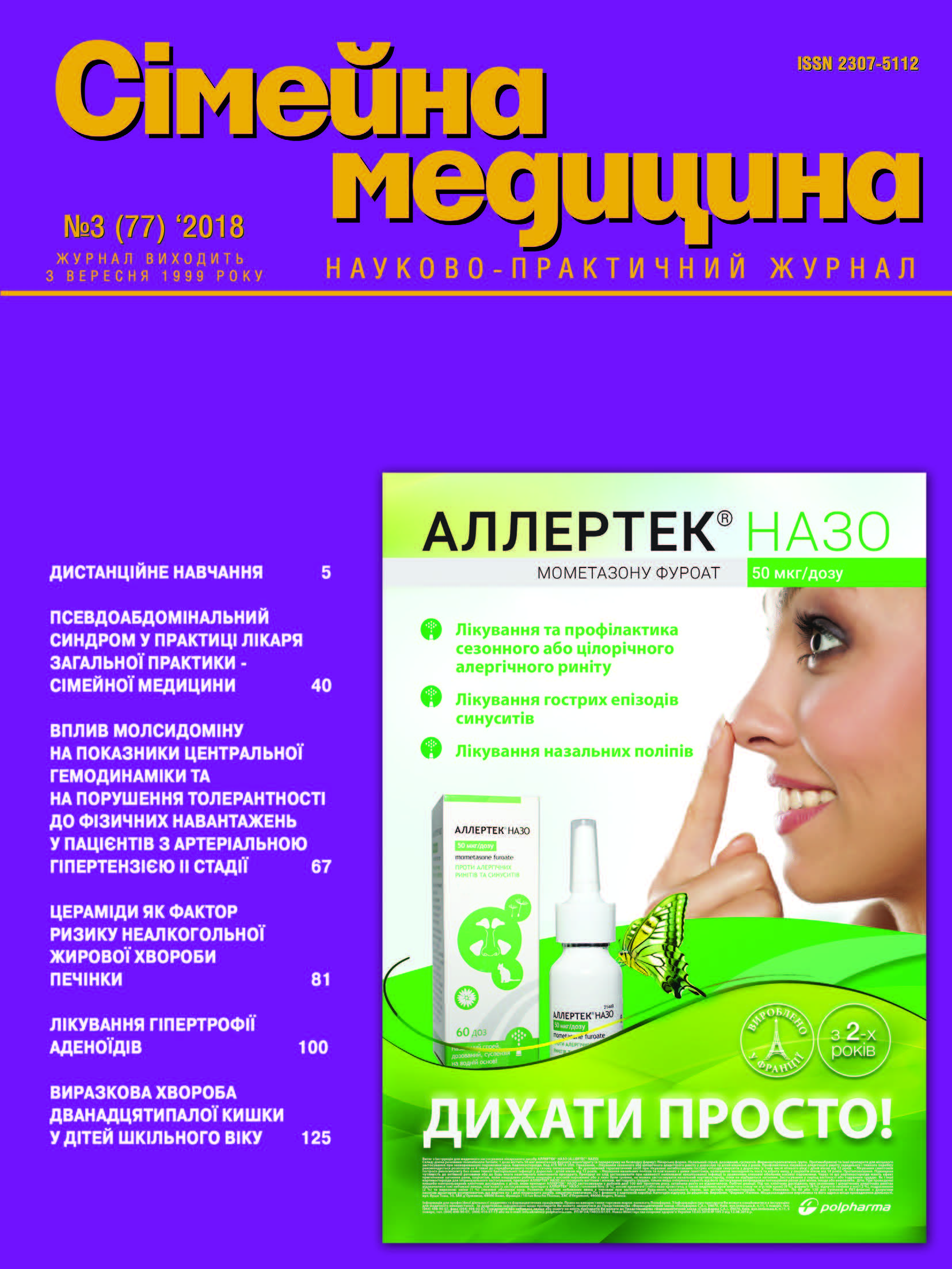Цераміди як фактор ризику неалкогольної жирової хвороби печінки
##plugins.themes.bootstrap3.article.main##
Анотація
##plugins.themes.bootstrap3.article.details##

Ця робота ліцензується відповідно до Creative Commons Attribution 4.0 International License.
Автори зберігають авторське право, а також надають журналу право першого опублікування оригінальних наукових статей на умовах ліцензії Creative Commons Attribution 4.0 International License, що дозволяє іншим розповсюджувати роботу з визнанням авторства твору та першої публікації в цьому журналі.
Посилання
Vernon, G., Baranova, A., and Younossi, Z.M. Systematic review: the epidemiology and natural history of non-alcoholic fatty liver disease and non-alcoholic steatohepatitis in adults. Aliment Pharmacol Ther. 2011; 34: 274–85https://doi.org/10.1111/j.1365-2036.2011.04724.x
Angulo P. GI Epidemiology: nonalcoholic fatty liver disease. P. Angulo // Alimentary Pharmacology & Therapeutics. – 2007. – V. 25. – P.883–889. https://doi.org/10.1111/j.1365-2036.2007.03246.x
Oh M.K. Review article: diagnosis and treatment of non-alcoholic fatty liver disease. M.K.Oh, J.Winn, F. Poordad // Ailment Pharmacol Ther. – 2008. – Vol. 28. – P. 503–522. https://doi.org/10.1111/j.1365-2036.2008.03752.x
Exendin-4 improves steatohepatitis by increasing Sirt1 expression in highfat diet-induced obese C57BL/6J mice. J Lee, SW Hong, SW Chae et al. // PloS One. – 2012. –Vol.7, N2. – P.63–72. https://doi.org/10.1371/journal.pone.0031394
Randomized controlled trial testing the effects of weight loss on nonalcoholic steatohepatitis. K Promrat, DE Kleiner, HM Niemeier, E Jackvony et al. // Hepatology. – 2010. – V51. – P121–129 https://doi.org/10.1002/hep.23276
Targher G, Bertolini L, Padovani R, et al. Prevalence of nonalcoholic fatty liver disease and its association with cardiovascular disease in type 2 diabetic patients. Diabetes Care 2007; 30:1212–1218. https://doi.org/10.2337/dc06-2247
Amarapurkar D, Kamani P, Patel N, Gupte P, Kumar P, Agal S, Baijal R, Lala S, Chaudhary D, Deshpande A. Prevalence of non-alcoholic fatty liver disease: population based study. Ann Hepatol. 2007; 6(3):161–163. Park SH, Jeon WK, Kim SH, Kim HJ, Park DI, ho K, Sung IK. PDF
Vernon G, Baranova A, Younossi ZM. Systematic review: the epidemiology and natural history of non-alcoholic fatty liver disease and nonalcoholic steatohepatitis in adults. Aliment Pharmacol Ther 2011; 34: 274–285 http://dx.doi.org/10.1111/j.1365-2036.2011.04724.x
EASL–EASD–EASO Clinical Practice Guidelines for the management of nonalcoholic fatty liver disease 2016 https://doi.org/10.1016/j.jhep.2015.11.004
Argo CK, Caldwell SH. Epidemiology and natural history of non-alcoholic steatohepatitis. Clin Liver Dis 2009; 13:511–31. https://doi.org/10.1016/j.cld.2009.07.005
Peverill W, Powell LW, Skoien R. Evolving concepts in the pathogenesis of NASH: beyond steatosis and inflammation. Int J Mol Sci 2014; 15:8591–638. https://doi.org/10.3390/ijms15058591
Bugianesi E, Moscatiello S, Ciaravella MF, et al. Insulin resistance in nonalcoholic fatty liver disease. Curr Pharm Des 2010; 16:1941–51. https://doi.org/10.2174/138161210791208875
Cusi K. Role of insulin resistance and lipotoxicity in nonalcoholic steatohepatitis. Clin Liver Dis 2009; 13:545–63. https://doi.org/10.1016/j.cld.2009.07.009
Musso G, Cassader M, Gambino R. Non-alcoholic steatohepatitis: emerging molecular targets and therapeutic strategies. Nat Rev Drug Discov. 2016, Apr;15(4):249–74. https://doi.org/10.1038/nrd.2015.3
Castro, B. M., Prieto, M. & Silva, L.C. Ceramide: a simple sphingolipid with unique biophysical properties. Prog. Lipid Res. 54, 53–67 (2014). https://doi.org/10.1016/j.plipres.2014.01.004
Gault, C.R. et al. (2010) An overview of sphingolipid metabolism: from synthesis to breakdown. Adv. Exp. Med. Biol. 688, 1–23 Full text
Frangioudakis, G. et al. (2010) Saturated-and n-6 polyunsaturated-fat diets each induce ceramide accumulation in mouse skeletal muscle: reversal and improvement of glucose tolerance by lipid metabolism inhibitors. Endocrinology 151, 4187–4196 https://doi.org/10.1210/en.2010-0250
Chocian, G. et al. (2010) High fat diet induces ceramide and sphingomyelin formation in rat’s liver nuclei. Mol. Cell. Biochem. 340, 125–131 https://doi.org/10.1007/s11010-010-0409-6
Nikolova-Karakashian, M.N. and Rozenova, K.A. (2010) Ceramide in stress response. Adv. Exp. Med. Biol. 688, 86–108 https://doi.org/10.1007/978-1-4419-6741-1_6
Holland, W.L. and Summers, S.A. (2008) Sphingolipids, insulin resistance, and metabolic disease: new insights from in vivo manipulation of sphingolipid metabolism. Endocr. Rev. 29, 381–402 https://doi.org/10.1210/er.2007-0025
Clarke, C.J. et al. (2006) The extended family of neutral sphingomyelinases. Biochemistry 45, 11247–11256 https://doi.org/10.1021/bi061307z
Mari, M. and Fernandez-Checa, J.C. (2007) Sphingolipid signalling and liver diseases. Liver Int. 27, 440–450 https://doi.org/10.1111/j.1478-3231.2007.01475.x
Summers, S.A. (2006) Ceramides in insulin resistance and lipotoxicity. Prog. Lipid Res. 45, 42–72 https://doi.org/10.1016/j.plipres.2005.11.002
Semple, R.K. et al. (2009) Postreceptor insulin resistance contributes to human dyslipidemia and hepatic steatosis. J. Clin. Invest. 119, 315–322 https://doi.org/10.1172/JCI37432
JeBailey, L. et al. (2007) Ceramide and oxidant-induced insulin resistance involve loss of insulin-dependent Racactivation and actin remodeling in muscle cells. Diabetes 56, 394–403 https://doi.org/10.2337/db06-0823
Ribaux, P.G. and Iynedjian, P.B. (2003) Analysis of the role of protein kinase B (cAKT) in insulin-dependent induction of glucokinase and sterol regulatory element-binding protein 1 (SREBP1) mRNAs in hepatocytes. Biochem. J. 376, 697–705 https://doi.org/10.1042/BJ20031287
Colombini, M. (2010) Ceramide channels and their role in mitochondriamediated apoptosis. Biochim. Biophys. Acta 1797, 1239–1244 https://doi.org/10.1016/j.bbabio.2010.01.021
Mari, M. et al. (2008) Mechanism of mitochondrial glutathione-dependent hepatocellular susceptibility to TNF despite NF-kappaB activation. Gastroenterology 134, 1507–1520 https://doi.org/10.1053/j.gastro.2008.01.073
Edelmann, B. et al. (2011) Caspase-8 and caspase-7 sequentially mediate proteolytic activation of acid sphingomyelinase in TNF-R1 receptosomes. EMBO J. 30, 379–394 https://doi.org/10.1038/emboj.2010.326
Mangesh Pagadala, Takhar Kasumov,Arthur J. McCullough,Nizar N. Zein,and John P. Kirwan Role of Ceramides in Nonalcoholic Fatty Liver Disease Trends Endocrinol Metab. 2012 Aug; 23(8): 365–371. https://dx.doi.org/10.1016%2Fj.tem.2012.04.005





